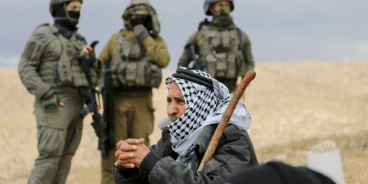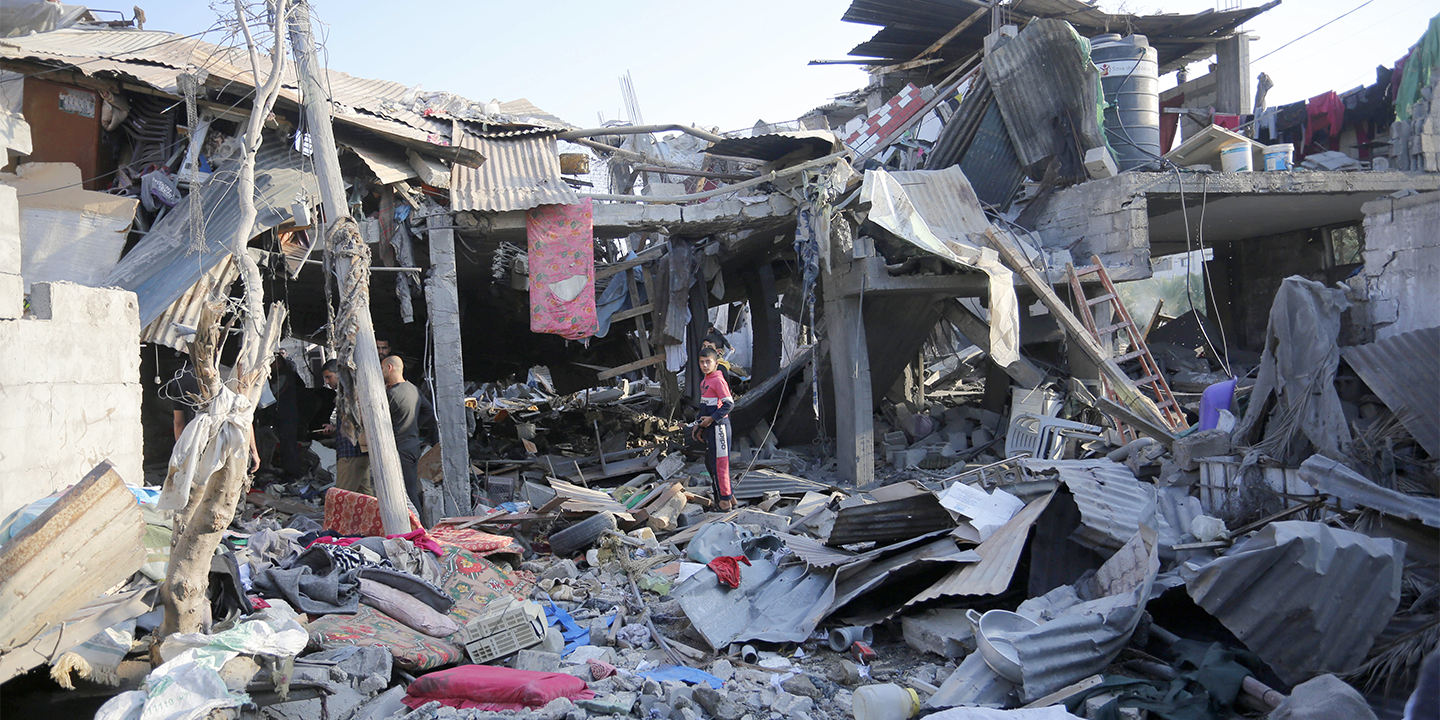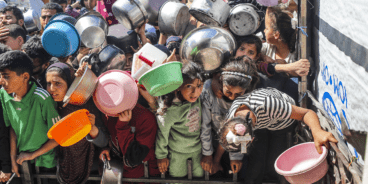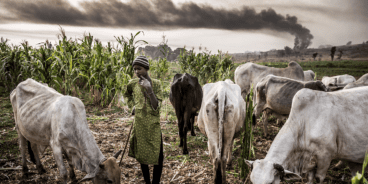

Atrocity Alert No. 375: Israel and the Occupied Palestinian Territory, Haiti and China
Atrocity Alert is a weekly publication by the Global Centre for the Responsibility to Protect highlighting situations where populations are at risk of, or are enduring, mass atrocity crimes.
HOSTILITIES RESUME IN GAZA WITH DEVASTATING CONSEQUENCES FOR CIVILIANS
On 1 December hostilities between Israel and Hamas resumed following a week-long humanitarian pause. Israeli strikes and shelling from air, land and sea, as well as ground operations have significantly intensified, inflicting the heaviest bombardments across Gaza since 7 October. Over 1,200 Palestinians have been killed since 1 December, in addition to the approximately 15,000 killed prior to the pause. Palestinian armed groups also resumed firing rockets into Israel, with no casualties reported. Approximately 137 hostages, who were taken by Hamas and other Palestinian armed groups on 7 October, remain captive in Gaza.
Since the resumption of hostilities, Israeli military operations have expanded into southern Gaza, an area hosting over 1.1 million Palestinians who were previously forced to evacuate from northern Gaza during Israeli operations in Gaza City. The Israeli military published a detailed map on social media which divides the Gaza Strip into hundreds of small areas, reportedly intended to facilitate evacuation orders. The military has designated various areas on the map for immediate evacuation, including an order for those residing in areas in Khan Younis to move into Rafah. Prior to 7 October, Khan Younis was home to over 117,000 Palestinians and tens of thousands of internally displaced people have fled there since the forced evacuation of northern Gaza. The latest evacuation order has resulted in waves of secondary displacement and forced Palestinians into increasingly compressed spaces in Rafah. Gaza remains under an electricity blackout and telecommunications cuts are frequent, rendering Palestinian’s access to these online maps inconsistent or impossible.
While the week-long pause brought desperately needed aid into Gaza and allowed humanitarian actors to accelerate delivery across the Gaza Strip – including to northern areas that had been cut off from aid for weeks – the expansion of Israeli military operations is strangling ongoing operations. The two most important routes to reach populations in need within Gaza, namely the coastal road and the Salah Ad Deen Road, have been cut off to humanitarian convoys. The UN Office for the Coordination of Humanitarian Affairs recently warned that the current quantities of relief supplies and fuel that are allowed in are “utterly insufficient” and that “conditions required to deliver aid to the people of Gaza do not exist. If possible, an even more hellish scenario is about to unfold, one in which humanitarian operations may not be able to respond.” Approximately 1.8 million displaced Palestinians in Gaza, the majority of whom are confined to southern Gaza, are desperate to find food, water and shelter.
The Office of the UN High Commissioner for Human Rights has warned, “The pattern of attacks that target or impact on civilian infrastructure raises serious concerns about Israel’s compliance with international humanitarian law and significantly raises the risk of atrocity crimes.” There is currently nowhere safe for civilians to go in Gaza. A permanent humanitarian ceasefire must be urgently reached to bring an end to the ongoing suffering of all innocent civilians in Gaza and Israel.
SPREADING GANG VIOLENCE TO HAITI’S CENTRAL REGION INCREASES PROTECTION RISKS
Over the last two years, there has been a significant rise in gang violence in Haiti’s central region of Lower Artibonite, according to a report released by the Office of the UN High Commissioner for Human Rights and UN Integrated Office in Haiti. Killings, theft, destruction of property, kidnappings and other abuses are committed on a near daily basis against civilians, giving rise to a “climate of fear” in Lower Artibonite. Between January 2022 and October 2023 at least 1,694 people were killed, injured or kidnapped. Gangs are utilizing sexual violence as a weapon against women and children to spread fear and punish those living in “rival” villages. During attacks on villages the gangs also execute members of local populations considered to be “rivals,” and burn abductees to force their families to pay ransoms. Kidnappings and associated requests for ransom are a vital source of income for gangs to carry out operations and purchase weapons.
According to the report, at least 20 criminal groups, including gangs and vigilante groups, operate in Lower Artibonite, where there is sparse police presence and a lack of basic government institutions. The largest and most violent criminal groups are backed by the powerful G-Pep coalition operating in the capital, Port-au-Prince. In the absence of law enforcement, civilian self-defense movements – known as “Bwa Kale” – have formed. Members of these vigilante groups often carry machetes and knives and are known for extreme brutality when meting out retribution as they search for alleged gang members, particularly with indiscriminate lynching. The UN has documented 420 cases of lynching in vigilante justice so far, with 11 percent of them in Lower Artibonite.
The spread of violence to Artibonite, the nation’s main rice-growing region, has had disastrous consequences for people’s livelihoods and compounded an already critical humanitarian emergency. Gangs have stolen crops and livestock, blocked irrigation systems, attacked and occupied agricultural lands, imposing “hefty” taxes on farmers to pay for access. As a result, more than 45 percent of Lower Artibonite’s population is facing acute food insecurity.
UN High Commissioner for Human Rights Volker Türk warned, “The situation in Haiti is cataclysmic.” The deteriorating human rights and security situation in Haiti requires a swift and robust response by the international community. The Multinational Security Support Mission should be urgently deployed. The UN Security Council should update the list of individuals and entities subject to the sanctions regime for supporting, preparing, ordering or committing violations or abuses of International Human Rights Law, as well as fully implement the arms embargo. Haitian authorities should heed the report’s recommendations, including deploying more police to Artibonite and increasing salary increases for police and justice officials.
CHINESE GOVERNMENT EXPANDS CRACKDOWN ON ISLAM BEYOND THE UYGHUR REGION
In recent years, Chinese authorities have expanded their practices of closing, decommissioning, demolishing and converting mosques as part of an ongoing national strategy to “curb the practice of Islam in China,” Human Rights Watch (HRW) warned on 22 November. As part of the so-called “mosque consolidation policy,” authorities are instructed to “strictly control the construction and layout of Islamic activity venues” and “adhere to the principle of demolishing more and building less.” Satellite imagery and social media documentation show the destruction and repurposing of mosques, as well as the removal of domes and minarets in the Ningxia Hui Autonomous Region and Gansu province. Remaining places of worship are surveilled by authorities, a measure used by the government to reinforce fear and social control. While such practices have been well-documented in the so-called Xinjiang Uyghur Autonomous Region (the Uyghur Region), HRW also documented similar patterns in Ningxia and Gansu – areas home to the largest Muslim population outside of Xinjiang.
Since 2016 a systematic crackdown on freedom of religion has intensified under President Xi Jinping to ensure state control over religion and “Sinicize Islam” or make it “more Chinese.” Independent UN experts and civil society organizations have previously documented how the government has effectively outlawed the practice of Islam in the Uyghur Region to the extent where possessing a Quran can lead to detention. According to the Uyghur Human Rights Project, at least 1,046 imams and other religious figures from the Uyghur Region have been detained in camps or imprisoned since 2014. The government has also destroyed or damaged about 16,000 mosques since 2017, while 28 percent of other Islamic sacred sites — including shrines, cemeteries and pilgrimage routes — are damaged, and 30 percent completely destroyed.
During an event hosted by the Global Centre for the Responsibility to Protect, Zumretay Arkin, Spokesperson of the World Uyghur Congress, warned that the destruction and assimilation of cultural heritage and places of worship “prevent intergenerational transmission of cultural, linguistic and religious practices, which is the foundation of a people” and that systematic abuses in Xinjiang and beyond “have to be understood in a broader context of oppression and social control.” In August 2022 the Office of the UN High Commissioner for Human Rights found that the systematic repression of predominantly Muslim and/or Turkic groups in Xinjiang – committed under the guise of combating religious extremism – may amount to crimes against humanity.
States should utilize the Universal Periodic Review in January 2024 to provide targeted recommendations to Chinese authorities to address ongoing atrocity crimes in the Uyghur Region and beyond, including by calling upon the government to cease all measures aimed at restricting the right to religious freedom of Uyghur and other predominantly Muslim and/or Turkic groups.
Related Content


Gaza: Starvation or Gunfire - This is Not a Humanitarian Response
